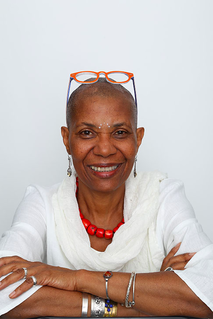 M. NourbeSe Philip M. NourbeSe Philip M. NourbeSe Philip will join us at Western University as the 2013-14 Writer-in-Residence in the Fall term. Guggenheim fellow, winner of a Toronto Arts Award, poet, fiction writer, essayist, dramatist and lawyer, M. NourbeSe Philip was born in Tobago and moved to Canada to attend Western University, where she graduated with a law degree in 1973. After seven years in practice, first at Parkdale Community Services and then in the partnership Jemmott and Philip, Philip left law in 1983 to devote her time to writing. Philip’s most recent book, Zong! (2008) is a book-length poem based on an eighteenth-century court case, Gregson vs. Gilbert, the only public document related to the lives and deaths of 150 Africans murdered for insurance money aboard the slave ship Zong. Fugal, fragmented, and deeply moving, Zong! has been adapted through multimedia performance, including a dramatized reading at Toronto Harbourfront as part of "rock.paper.sistahz" in April 2006. In 2012, Philip held a seven-hour interactive reading of the complete poem at b current studio space in Toronto while simultaneously, in Blomfontaine, South Africa, another audience held a collective reading. Philip’s other major works include the young adult novel Harriet’s Daughter (1988), her second novel Looking for Livingstone: An Odyssey of Silence (1991) and the groundbreaking and award-winning poetry collection She Tries Her Tongue, Her Silence Softly Breaks (1989), winner of the Casa de las Americas Prize in poetry. Author of four collections of essays, three additional collections of poetry, and two plays, Philip’s work spans and interweaves genres, attending to language in particular—her work is often noted for its deconstruction of grammar, while her newest poem engages legal language. Philip takes up themes of colonialism, race, memory, identity, and place, modeling the intersections of politics and poetics with her innovations on form. In her non-fiction work, Philip is a committed social critic, bringing her years of study in economics, political science and law to bear on Canadian social policy. Her poetry is included in the new collection, The Great Black North: Contemporary African-Canadian Poetry (Frontenac House, 2013). Biography by Nina Budabin McQuown RUSTY TALK WITH M. NORBESE PHILIP Scott Beckett: What is your first memory of writing creatively? M. NourbeSe Philip: My first memory of writing creatively was actually writing a piece about my fear of flying which was sparked by being on a plane with my very young son for the first time. I remember taking him to the washroom and him being so fascinated by the loud sucking noise of the toilet while all I could think of was what was on the other side of the toilet—space, nothingness. It was actually published in a traveller’s magazine whose name I now don’t remember. SB: How did you decide to become a writer? NP: The process was very gradual. I come from an island nation that was once a colony of the British Empire and, as a young child, lived through a very exciting time as the island moved towards independence. Part of the change was that for the first time there was universal secondary education and parents wanted what all parents want for their children—the best. This did not include becoming writers. There is an essay I wrote about this process of coming to writing, “The Absence of Writing or How I Almost Became a Spy,” in which I talk about reading a lot as a child, and I write something to this effect: “Books for so.” (The Caribbean vernacular for saying there were lots of books.) Other people were writing them, we were reading them. The mindset was that you wanted your child to be a lawyer or a doctor, failing that then a teacher or, perhaps, nurse, and if all else failed then a civil servant. Writing was not an option. It’s important to understand that for me writing wasn’t on my radar. I began writing poetry while I practised law, and even though I knew I wasn’t going to spend the rest of my life in law (I think I did law because my father wanted to be a lawyer and never did become one), I still didn’t think I would become a writer. But at some point I remember thinking maybe, just maybe, I’ve got something to say that someone might listen to. It was that tentative, for all those historical and cultural reasons. It certainly wasn’t a sort of Saul-on-the-way-to-Damascus type of epiphanic event. SB: What is your writing process like? Do you write in a certain place or time? Is it an everyday activity, or is it when the ideas come to you? NP: I like writing in the mornings and I try to do it—emphasis on the “try”—on a daily basis. I don’t always succeed. Having said that, however, I find myself “scribbling” every day. It might not necessarily be something that I’m thinking will be my next poem or my next novel or next play, but I am always aware that these scribbles could be useful. Periods of time will get more intense, of course, if there’s a project that is formed, or there is a piece of writing I feel I have to do—then it all becomes a lot more conscious and focused. But those “scribbles” are really important because they are scribbles. Often you may think that they’re not important but later on, you realize that they can be very helpful. It is the fact that they are scribbles and “not important” that makes them valuable—the untethered mind in free fall. SB: Has anything important come from these sessions of “scribbling?” NP: Yes, I have a sense that I have one more book of poetry and what I have in mind actually is based on those “scribbles.” SB: So that is what you’re working on right now? NP: Yes, or not working on, or un-working on. SB: Is there a piece that you’ve written that you are particularly fond of that you would consider to be your favourite? NP: It is like asking which of your children you like best. Different pieces for different reasons, but I’ll say Zong! right now, maybe because it is my most recent child, my youngest child. I’m saying that also because it is moving into areas that I have never ever ventured in to. My work has tended to be primarily page bound, as much poetry is, but this work is moving into performance or what I call unperformance or de-performance, and I’m really interested in that. SB: What is your advice to young writers? NP: At any point in time, there are at least two poems, two stories, two novels that are there: the one you think you want to write, the other, the one you have to get out of the way of to let it write itself through you. What I’m talking about is getting your ego out of the way to let what has to be written write itself through you. So writing then becomes an act of surrender and revelation to yourself. And ultimately to the reader. 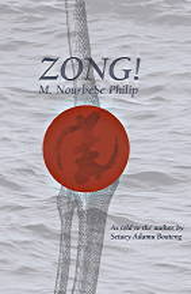 M. NORBESE PHILIP'S MOST RECENT BOOK Zong!, Weslyan University Press and by The Mercury Press in Canada, 2008 Description from the Publisher: In November, 1781, the captain of the slave ship Zong ordered that some 150 Africans be murdered by drowning so that the ship’s owners could collect insurance monies. Relying entirely on the words of the legal decision Gregson vs Gilbert--the only extant public document related to the massacre of these African slaves--Zong! tells the story that cannot be told yet must be told. Equal parts song, moan, shout, oath, ululation, curse, and chant, Zong! excavates the legal text. Memory, history, and law collide and metamorphose into the poetics of the fragment. Through the innovative use of fugal and counterpointed repetition, Zong! becomes an anti-narrative lament that stretches the boundaries of the poetic form, haunting the spaces of forgetting and mourning the forgotten. Information on how to meet with NourbeSe Philip for London and Western folks: NourbeSe Philip will hold weekly office hours on Tuesdays and Wednesdays from 10:00 am to 5:00 pm, to offer feedback to, and consultation with, both experienced and novice creative writers from the university and the London community. She will accept works of poetry, fiction, creative non-fiction and drama. Scott Beckett is Western University's 2013-14 Student Writer-in Residence. 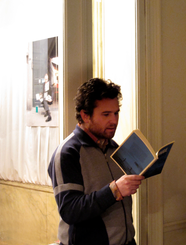 Jacob Wren Jacob WrenPhoto by Brancolia JACOB WREN is a writer and maker of eccentric performances. His books include: Unrehearsed Beauty, Families Are Formed Through Copulation and Revenge Fantasies of the Politically Dispossessed. As co-artistic director of Montreal-based interdisciplinary group PME-ART he has co-created the performances: En français comme en anglais, it's easy to criticize (1998), the HOSPITALITÉ / HOSPITALITY series including Individualism Was A Mistake (2008) and The DJ Who Gave Too Much Information (2011) and Every Song I’ve Ever Written (2012). He travels internationally with alarming frequency and frequently writes about contemporary art. RUSTY TALK WITH JACOB WREN Kathryn Mockler: What is your first memory of writing creatively or being creative? Jacob Wren: I don’t know if I have a first memory. But I do know around age thirteen I started suffering from terrible insomnia. Some nights I didn’t sleep at all, while most nights I slept very little. And basically I just filled the endless, sleepless nights with reading and writing, for more or less ten years, until I realized that the simple cure for my insomnia was rigorous physical exercise. Still, to this day, I associate writing with the strange, hallucinatory state that comes from having barely slept for weeks on end, as a kind of unreal trance, almost like a dream. It was during those nights, lying awake, almost too tired to move, that I first trained myself to write. KM: Why did you become an artist/writer and what keeps you going? JW: To be honest, the only thing that has ever really interested me was art (in all its many forms.) I wish I could become interested in something else, since I feel, as a human being, at times this overemphasis on artistic interests makes me a bit narrow, as well as making my interactions with other people often rather difficult. (I mean, I do my best.) At the same time, I find it very hard to maintain any interest in art and often don’t know exactly what keeps me going (except that I have no idea what else I could possibly do). Sometimes I remind myself a bit of this apocryphal story of a Russian who moved to New York but never learned English. Gradually, over the course of his life, he forgot how to speak Russian, yet still never learned English, so in the end he spoke no language at all. Gradually I am becoming less and less interested in art, while not really becoming interested in anything else, so in the end I’m kind of nowhere. Like a priest who has lost faith. But that makes it all sound more dire than it actually is. Still, I think it’s important that we talk about these things, since hardly anyone ever does. I have often said that I don’t particularly relate to people who make performance, or write, or make art, but I do relate to people who make performance / writing / art who think about quitting every fifteen seconds. Those are really my people. I call us the ‘boy who cried wolf set’. Because, for me, if you really look at art today, at what it means, at who it reaches, at what is considered successful or important, it often seems like a complete waste of time. If I had any talent for it, or drive towards it, I would definitely quit art and become an activist, since the world’s problems are now so overwhelming, immediate and tragic. But, for better or worse, I can’t seem to get myself to do anything else: all I can really do is write. (Well, I also make performances, but that becomes harder and harder as the years roll on.) KM: How would you describe your writing process? How does your blog A Radical Cut in the Texture of Reality fit into this process? JW: I mainly feel like I don’t really have a process. I just have ideas and write them down to the best of my ability. Often I try to write every morning, but then, at other times, I am stuck for months on end and write very little. I usually do a first draft in a notebook, and then type it up as I go. Sometimes there is a little bit of re-writing as I type it into the computer, but mainly the second draft just allows me to think more about what I’m doing. I definitely started my blog, in 2005, because I had almost completely stopped writing and was looking for a way to start again. It’s always been difficult for me to get published—I suppose what I write doesn’t quite fit anywhere (maybe it’s a little bit easier now, I’m not sure)—but at the time being able to just post what I was writing on my blog, as I went along, gave me more of a feeling that I was actually doing something. I would tell myself: just write one paragraph and post it, then at least you will have written one paragraph. It kind of made me feel like writing was possible again, after having felt it was basically impossible for many years. (Mainly due to too many rejection letters, or more precisely to the fact that I’m a little bit too sensitive to such things.) Now my blog gets about 2,000 hits a month, so that must mean someone is reading it, but I don’t really have any sense of who is reading it, why, or what they think. There are hardly any comments. I spend so much time on the internet (mainly on Facebook and listening to music), and I know this has deeply affected how I think about art, about writing, and also how I practice it. It is difficult for me to really analyze what this change might be, it has all been so natural and intuitive, but I know there is something about the shuffle feature on iTunes, and about the seeming randomness as one clicks from one link to the next, that has been completely folded into my aesthetic. KM: What or who influences your writing? JW: I keep an ongoing list of favourite books: Some Favourite Books And recently I have added a list of visual artists: List of Artists But mainly I just want to devour everything. I want to have an overview. I want to know what is happening in art today, and everything that has ever happened in art before, and I want to use all of it while at the same time making it my own. I want to speak about the world, about the world today and about history, about ideas, thinking, philosophy, theory, and about my own subjective experiences. I want to struggle with it, admit to failure, be upset that I am not as good as the artists and authors I love but keep trying. I wish the mainstream was more open and more interesting. KM: Can you discuss the relationship between writer and reader or audience? Who would be your ideal reader? I’m interested also in terms of your blog and its readership. Does that audience inform your work in any way? JW: I have a sort of double life, half writing, the other half performing. When you perform the audience is right there in front of you, and all of my performance work is about trying to honestly deal with the fact that the audience is right there in front of me, about the paradox of trying to be yourself in the deeply unnatural situation of a room full of strangers watching you. I’ve always like the Gertrude Stein quote: “I write for myself and strangers.” When I was revising my last book, I showed it to a bunch of friends for comments, and I listened to all of their comments, and later, when the book came out, realized I had completely ignored basically all of their suggestions. I had asked for their help, and then completely ignored everything they said. (Well, I’ve always been stubborn.) And I feel this is so often the way between me and readers, I listen to every comment I get, think about it, try to take it in, fully absorb it, but never directly respond to anything anyone says. Nonetheless, I very much hope it is all in there anyway, somewhere in my head, affecting what I think, how I see what I’m doing, in some completely indirect way making the work better. KM: What is the best piece of literary advice you’ve gotten that you actually use? JW: As I’ve already suggested, I’m so bad with taking advice. But I really liked reading what Alain Badiou once said in an interview. He said the only rule for activism is: keep going. And I guess that’s mainly what I try to do now, keep going, which also means not making too many compromises, trying to offer up something different enough from everything else out there, trying to see the world a different way and put it into words. But, then again, I also constantly want to quit. Which is maybe why the advice is so important. Keep going. KM: What is your favourite or funniest literary moment, if you have one? JW: I actually can’t think of anything at the moment. Hopefully that means there are many favourite, hilarious literary moments to come. Maybe the future will be full of them. KM: What are you reading at the moment? JW: I just started reading The Empire Within: Postcolonial Thought and Political Activism in Sixties Montreal by Sean Mills. I believe I must be reading it because I live in Montreal. So far it’s fascinating. KM: What projects are you working on in 2013? JW: I am writing a new book entitled Polyamorous Love Song. Here is a short synopsis: It is a book of many different narrative through-lines. For example: 1) A mysterious group, known as The Mascot Front, who wear furry mascot costumes at all times and are fighting a revolutionary war for their right to wear furry mascot costumes at all times. 2) A movement known as the ‘New Filmmaking’ in which, instead of shooting and editing a film, one simply does all of the things that would have been in the film, but in real life. This movement has many adherents. Its founder is known only as Filmmaker A. 3) A group of ‘New Filmmakers’, calling themselves The Centre for Productive Compromise, who devise increasingly strange sexual scenarios with complete strangers. They invent a drug that allows them to intuit the cell phone number of anyone they see, allowing phone calls to be the first stage of their spontaneous, yet somehow carefully scripted, seductions. 4) A secret society that concocts a sexually transmitted virus that infects only those on the political right. They stage large-scale orgies, creating unexpected intimacies and connections between individuals who are otherwise savagely opposed to one another. 5) A radical leftist who catches this virus, forcing her to question the depth of her considerable leftist credentials. 6) A German barber in New York who, out of scorn for the stupidity of his American clients, gives them avant-garde haircuts, unintentionally achieving acclaim among the bohemian set who consider his haircuts to be strange works of art. And yet each of these stories is only the beginning. And we are also beginning a new, ongoing internet/performance project entitled Every Song I’ve Ever Written. Here is a description: From 1985 to 2004 Jacob Wren wrote songs. Lots and lots of songs. At the time not very many people heard them. Every Song I’ve Ever Written is a project about memory, history, things that may or may not exist, songwriting, the internet and pop culture. On the website everysongiveeverwritten.com you can listen to, and download, these songs. In a way, because hardly anyone heard them, these songs don’t yet exist. If you are reading this, we would like you to consider recording your own version of one of these songs, changing it, making it your own, then sending it to us. We will post every version we receive. There will also be performances and events. Solo performances will feature Jacob performing all of the songs in chronological order (it takes about five hours.) Band Nights will feature a series of local bands in different cities performing one of Jacob’s songs each. After each version, Jacob will interview the band about what it was like to cover the song, and the band will interview Jacob about what it was like to write it. We are not doing this because we think these are the best songs ever (we hope at least a few of them are good.) We are doing this because hardly anyone heard them at the time, and we are wondering if there is some new, strange way to bring them out into the world. In doing so we hope to raise a few questions about what songs mean on the internet, about what songwriting is actually like today, and also take a sidelong glance back at the recent past. LINKS Radical Cut in the Texture of Reality Every Song I've Ever Written PME-ART Tumblr Goodreads Le Quartanier 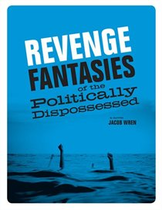 REVENGE FANTASIES OF THE POLITICALLY DISPOSSESSED Pedlar Press, 2010 Description from Pedlar Press: Set in a dystopian near-future, Revenge Fantasies of the Politically Dispossessed is a novel - a kind of post-capitalist soap opera - about a group of people who regularly attend ''the meetings.'' At the meetings they have agreed to talk, and only talk, about how to re-ignite the left, for fear if they were to do more, if they were to actually engage in real acts of resistance or activism, they would be arrested, imprisoned, or worse. Revenge Fantasies is a book about community. It is also a book about fear. Characters leave the meetings and we follow them out into their lives. The characters we see most frequently are the Doctor, the Writer and the Third Wheel. As the book progresses we see these characters, and others, disengage and re-engage with questions the meetings have brought into their lives. The Doctor ends up running a reality television show about political activism. The Third Wheel ends up in an unnamed Latin American country, trying to make things better but possibly making them worse. The Writer ends up in jail for writing a book that suggests it is politically emancipatory for teachers to sleep with their students. And throughout all of this the meetings continue: aimless, thoughtful, disturbing, trying to keep a feeling of hope and potential alive in what begin to look like increasingly dark times. Revenge Fantasies asks us to think about why so many of us today, even those with a genuine interest in political questions, feel so deeply powerless to change and affect the world that surrounds us, suggesting that, even within such feelings of relative powerlessness, there can still be energizing surges of emancipation and action 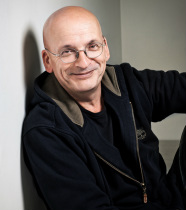 Roddy Doyle Photo by Mark Nixon Roddy Doyle was born in 1958. His work includes The Commitments, Paddy Clarke Ha Ha Ha (Booker Prize, 1993), The Woman Who Walked Into Doors, A Star Called Henry, and Bullfighting. His latest book is Two Pints (2012). A new novel, The Guts, will be published in August, in Ireland and the UK, and early 2014 in the USA. He divides his time between Dublin and confusion. RUSTY TALK WITH RODDY DOYLE Kathryn Mockler: What is your first memory of writing creatively? Roddy Doyle: I was about ten, I think, and my teacher, Mr. Kennedy, told the class to write something about a rainy day. This was Ireland, remember, so deep research wasn’t necessary. There were fifty-four boys in the class, and it was the first time we’d been told to write, or compose, anything—to make it up. I wrote about boredom. Mr. Kennedy looked over my shoulder, then read it to the class. KM: Why did you become a writer? RD: I loved reading. I loved football—soccer—but was a hopeless player. I loved music but hadn’t the patience or ability to learn an instrument. But I was literate, so writing seemed like an easy option. I forced myself into the habit, the routine. KM: What is the best writing advice that you’ve gotten that you actually use? RD: Treat it as a job; don’t expect magic. KM: How do you approach revision? RD: If by ‘revision’ you mean editing, I love it. So I approach it with a full heart and a red ballpoint. I tend to, deliberately, write too much. Editing is often a case of paring back. I’m fascinated, and sometimes worried, about how the deletion or addition of a word can alter meaning, tone, everything. When I’m editing, I put all other work aside and concentrate only on the pages I’m editing. I don’t play music, and I often lose track of time. KM: Your books often come out within a few years of each other. Do you work on multiple projects at the same time or stick to one project until it’s complete? Do you have difficultly switching from one genre to the next—particularly from adult fiction to children’s literature? RD: I work on different projects at the same time; I divide my working day, about 9am to 6pm, into chunks. As long as the projects are very different, they don’t tend to infect each other. I play a different type of music for each project. I could, I suppose, change shirts too, but that might be going too far. So, I can work for several hours on a novel, save it, hang out the washing, make a cup of coffee, change the Rolling Stones for Steve Reich, and get working on a treatment for a possible TV series or a book for children. KM: What writers were influential when you first started writing? Who are you reading now? RD: I think Flann O’Brien was important, particularly the Dublin dialogue in At Swim-Two-Birds. E.L. Doctorow’s Ragtime was important—the simplicity of the language. I’ve just finished George Saunders’ collection, Tenth of December; I think it’s magnificent. I’m reading a collection of J.G. Ballard interviews, called Extreme Metaphors. It’s great. KM: Given the amount of books that you’ve written, it seems impossible to imagine, but do you ever get writer’s block? And if you do, how do you overcome it? RD: No—never. KM: Do you ever abandon projects? If so, how do you know when it’s time to move on? RD: I’ve never abandoned, but I’ve parked projects for a while, stayed away from them until I was ready to look at them with that mixture of calm and excitement that I need if I’m going to work. Because I work on several things during the day, if one project isn’t going well, I can focus on another. KM: We often talk about the difficulty of rejection for writers but what about the problems that success can bring? After you won the Booker Prize in 1993 for Paddy Clarke Ha Ha Ha, for instance, what was it like sitting back down at the writing desk? RD: Success, however we measure it, is much nicer than rejection. But rejection can be like fuel to an almost empty engine. Rejection is a cousin of determination, and it’s part of the job. Success is too, if you’re lucky. The trick is, I think, to ignore it when you’re at your desk. I never let myself think that, just because I’ve won a prize, I’m not capable of writing shit. After winning the Booker, I couldn’t wait to get back to work. I love the work. KM: You posted your latest work Two Pints, which was just published in its entirety in November, as a serial on Facebook over the last year and half. Why did you decide to do this and what was the process like for you? Did the process have any affect on the end product? In other words, did the reader comments influence revisions? Would you do it again with another project? RD: I wrote the Two Pints pieces for fun. Someone suggested they’d make a good book, so—grand. It’s an accidental book, and still fun. I still write the Two Pints pieces, when the mood hits me and I have time. I often compose them as I’m walking, say, from the city centre, home. I type them up, make sure they’re less than 200 words, then post them on Facebook. I like the near-spontaneity of it—very different from how I normally work. It’s a little madness. I didn’t revise them, so reader comments, while nice, had no influence on them. I’d never be tempted to put work-in-progress up on Facebook. I don’t want to know what readers think until I know the work is finished. KM: What are you working on now? RD: I’ve just finished a novel, called The Guts. It’ll be out here and the UK in August, and the USA early in 2014. I’m writing a short story, about a man who’s injured when another man, in Lycra, cycles into him. I’m also working on a treatment for a possible TV series. ‘Possible’ is code for ‘It’ll never be made.’ I’m enjoying the job. Later this year, a musical based on my book, The Commitments, will go into rehearsal. I wrote the script, the ‘book’, so that will take up a lot of my time. I’m very excited about it. I’m tempted to say ‘I can’t wait’ but, actually, I can—just. 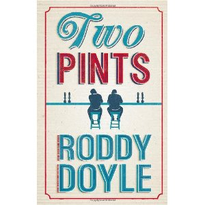 RODDY DOYLE'S LATEST BOOK Two Pints, published by Jonathan Cape, Vintage Publishing, 2012 Description from the publisher: Two men meet for a pint in a Dublin pub. They chew the fat, set the world to rights, take the piss… They talk about their wives, their kids, their kids’ pets, their football teams and--this being Ireland in 2011–12--about the euro, the crash, the presidential election, the Queen’s visit. But these men are not parochial or small-minded; one of them knows where to find the missing Colonel Gaddafi (he’s working as a cleaner at Dublin Airport); they worry about Greek debt, the IMF and the bondholders (whatever they might be); in their fashion, they mourn the deaths of Whitney Houston, Donna Summer, Davy Jones and Robin Gibb; and they ask each other the really important questions like ‘Would you ever let yourself be digitally enhanced?’ Inspired by a year’s worth of news, Two Pints distils the essence of Roddy Doyle’s comic genius. This book shares the concision of a collection of poems, and the timing of a virtuoso comedian. 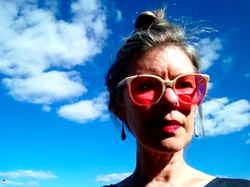 Lisa Robertson For many years LISA ROBERTSON has worked across disciplines and often in collaboration. With the late Stacy Doris she was the Perfume Recordist, an ongoing sound performance and writing project with work in the new I'll Drown My Book: Conceptual Writing by Women. She worked as The Office for Soft Architecture, publishing reports, essays, walks and manifestoes as well as curating and cooking as OSA. Currently she is translating the French linguists Emile Benveniste and Henri Meschonnic with Avra Spector. Her most recent book of poetry is R's Boat, from University of California Press, and Bookthug published a new book of essays, Nilling, in spring 2012. She lives in rural France, and teaches at Piet Zwart Institute in Rotterdam. RUSTY TALK WITH LISA ROBERTSON Kathryn Mockler: What is your first memory of writing creatively or being creative? Lisa Robertson: I think my earliest creative acts were acts of deception and truth bending—petty theft, rebuttal, cover-up. This led directly to writing. KM: Could you describe your writing process? (For example, do you write every day? When? Where? How do you approach revision, etc.) LR: Everyday I sit in an armchair and write in a notebook as I read. If somebody gives me resources I leave the armchair and travel to read in an exotic library. Writing on trains and airplanes on the way to and from these libraries is a special pleasure, because so much anticipation and repletion is involved. Talking to my friends usually shows me how to work with the material I have gathered. My dearest friends are the ones I simply obey. KM: How would you define experimental writing? LR: I wouldn't define experimental writing. It would cease to be experimental then. KM: What influences your work? LR: Unanswerable questions. Unanswerable to me that is. Right now I am trying to understand the movement a triangle sections, and I am trying to understand the humoural system of medicine. Put more simply, desire influences my work. KM: What have you read recently that excites you? LR: I just spent a month reading at the Warburg Institute in London, for 6-8 hours a day, six days a week. Everything excited me. I was reading about the relationships between geometry, astronomy, optics, and medicine in the ancient world, until the baroque era and Johannes Kepler's work on the elliptical orbits. I wanted to understand the dynamics of the ellipse, and I wanted to understand science as a relational query into the structure of the cosmos, rather than a recitation of the mechanics of cause and effect. Plato's Timeaus is hallucinogenic in that respect. So is Kepler's The Six-Sided Snowflake. So is medieval Arabic optics. These studies are enticing me to draw more, and that is a pleasure. In terms of recent poetry—Erin Moure's translations of Galician poet Chus Pato, Aisha Sasha John's new work, Angela Carr, the American poet Chris Nealon, and Francis Ponge. I read Ponge as a contemporary. KM: What is the best piece of writing advice you've heard or been given that you actually use? LR: Writing is the good use of boredom. I try to have a boring life. I don't socialize, and I eat nine servings of vegetables a day. KM: Your funniest or favourite literary moment, if you have one. LR: When Jam Ismael read at KSW in 2002 she sat a tape recorder on a windowsill and played a cassette recording of New Delhi crows. Vancouver crows came to the open window to listen and respond. Every emotion cracked open at once. KM: What are you working on now? LR: I am simply reading and learning, and making the occasional paragraph or drawing as record and exploration. 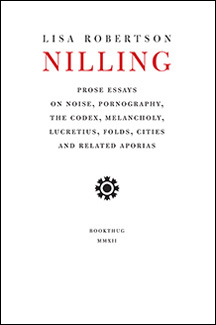 LISA ROBERTSON'S MOST RECENT BOOK Nilling, Bookthug, 2012 Description from the publisher: Nilling: Prose is a sequence of 6 loosely linked prose essays about noise, pornography, the codex, melancholy, Lucretius, folds, cities and related aporias: in short, these are essays on reading. Excerpts from Nilling: EXCERPT 1 I have tried to make a sketch or a model in several dimensions of the potency of Arendt's idea of invisibility, the necessary inconspicuousness of thinking and reading, and the ambivalently joyous and knotted agency to be found there. Just beneath the surface of the phonemes, a gendered name rhythmically explodes into a founding variousness. And then the strictures of the text assert again themselves. I want to claim for this inconspicuousness a transformational agency that runs counter to the teleology of readerly intention. Syllables might call to gods who do and don't exist. That is, they appear in the text's absences and densities as a motile graphic and phonemic force that abnegates its own necessity. Overwhelmingly in my submission to reading's supple snare, I feel love. EXCERPT 2 In the facsimile Oblongus Codex, at the bottom margin on the page containing lines 1140-1159 of the fourth book of De rerum natura, I saw what at first appeared to be the photographed image of a small oval hole about the size and shape of my thumbnail, tidily cut from the vellum of the original. Bordering this ellipse, I saw a faint drawing that added a labial ornamental border around the shape. It seemed that some sort of monkish pornographic doodle had been censored. At closer examination I realized that the elliptical absence had in fact not been cut from the page by some historical censor--it was rather a flaw inherent in the structure of the vellum; the trace of a wound perhaps. Several of these photographed images of material mise-en-abimes appeared as I leafed through the codex. In each case the page was cut from the larger skin so that the scar found its place in a margin, so as not to interfere with the scribe’s work. But here in book four, the scribe had decorated the flaw in the skin with this mildly and endearingly erotic doodle. The tiny absence was animated: a lacework. 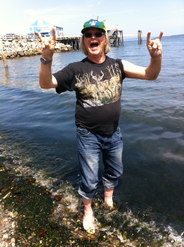 bill bissett Photo by Joy Masuhara bill bissett born on lunaria sum 4oo yeers ago approximatelee in lunarian time was sent 2 erth on first childrns shuttul from th at that time trubuld planet landid in halifax moovd 2 vancouvr at 17 moovd 2 london wher i was part uv luddites alternativ rock band thn toronto wher ium poet in residens at workman arts & recording with pete dako wanting alwayze 2 xploor words n sounds n image in th writing n painting showing paintings at th secret handshake art galleree toronto most recent book novel from talonbooks rusty talk with bill bissett I asked bill bissett these questions about his writing process:
He responded by email over the month of September 2012: dere kathryn th first 2 qwestyuns 4 rustee talk mor as it cums in th first creativ work i remembr was in grade 3 or 4 b4 going in2 th hospital 4 a coupul uv yeers was a pome i wrote abt sail boats in th watr n th feeling in my brain n heart was veree thrilling 4 me an elixr reelee thn a littul whil latr aftr mor thn a few operaysyuns i was in th oxygen tent n realizing i wud nevr b a dansr n or a figur skatr my first reel ambishyuns i cud write n paint i thot n that way feel th line mooving thru space n that way as well feeling th taktilitee uv life being physikal th enhansment from th abstraksyuns uv th skripts we wer ar all living thru i wrote my first storee thn in th oxygen tent wher i was deliting 2 drink orange crush n see th brite orange liquid cumming out uv my bodee immediatelee thru mor tubes i lovd that n that orange runway made me laff n feel veree poignant as well as my home planet lunaria was veree orange b4 all us childrn were remoovd from that troubuld planet n sent 2 erth my first storee wch i wrote in th oxygen tent was abt a boy who didint want 2 follow rules n wantid 2 find his own way n swam out past th undrtow wch oftn was both a physikal risk n a metaphor 4 sew manee othr things in nova scotia n at great dangr he ovrcame th fors from th watr n made it 2 shore n thn vowd he wud dew it agen n agen sirtinlee if life wer as friabul as it seemd sew definitlee 2 b why not take th risk my fathr had th storee typd out in several mor copees that was my first publishd work i feel veree warm abt him now in ths moment that he did dew that 4 me n evn tho i didint reelee start writing agen until aftr my mothr went 2 spirit evn a few yeers aftr that 16 n reelee agen full time until i got 2 vancouvr 17 my yerning 2 b always writing evr sins i was in th oxygen tent at 10or 11 has nevr left me influenses medium genre hungree throat mor as it cums in th subjekt 4 me is th genre n th genre is th subjekt iuv alwayze wantid 2 put books 2gethr that hold or contain diffrent genres as iuv also writtn pomes that contain difrent genres iuv oftn calld such pomes fusyun pomes my most recent work novel my first novel made me mor aware uv th medium is th genre n th genre is th medium n th medium slash subjekt is th genre mor aware thn evr how we write is can b what we ar writing abt mor thn an approach 2 mor thn creating th nuans uv it is th uv in my first novel calld novel abt 2 yeers ago brout out by talonbooks its a collagist work prob also calld post modernist in that th linear flow storee line is part uv th whol work is not th whol work th whole work inklewds th modernist storee line th serch 4 a trew love elements uv gangstr espionage n th serch n what happns evn tho veree labyrinthean also inklewds essays sum abt peopul we know in th known fakshul world introdusing ideas uv ficksyun fakt identitee dew we reelee know them can we n wch them is it a fact n pomes also like th essays hiliting theems that ar in th storee line th charaktrs mooving thru space n time n situaysyuns n thr is a hi degree uv th elements uv randomness wch th strukshur uv th work novel conveys inklewds n is conveying my first biggest n still biggest influens is gertrude stein who showsd n shows me espeshulee in stanzas in meditaysyuns that words need not onlee 2 represent but ar in themselvs konstrukts wch fold unfold n refiliing fold in2 n out uv each othr ar in fakt puzzuls made uv each othr sew they can b on theyr own not representing bcumming n being what whats dew our grammars cum from our emosyuns n or dew our emosyuns mostlee reelee cum from our binaree based grammar thees unsolvabul qwestyuns prsist n ar oftn endlesslee interesting yes othr huge erlee influenses allen ginsberg robert duncan denise levrtov bob cobbing diane di prima sew manee infinitlee manee d.a. levy bpNichol martina clinton maxine gadd judith copithorne influences with also sew manee n now 2day peopul othr poets i dew reedings with sew impressd with adeena karasick kai kellough sheri- d wilson ivan coyote richard van de camp david bateman naomi laufer jill mcginn toshio ushiroguchi-pigott chadwick juriansz ar names uv amayzing poets that jump 2 mind helen posno hungree throat my nu book my second novel is mor a novel in meditaysyun 2 charaktrs alredee found each othr trying 2 let each othr farthr n furthr in wun afrayd uv intimasee from his memoreez being 2 chargd n not let go uv how hard that is getting ovr trauma his bad memoree attacks drag him away from whom he loves evn from himself in th present n ths collagist post modernist work tho not as much prhaps as novel inklewds essays pomes seeminglee unrelatid help th reedr n th work 2 reflekt on all th key issews in ths work that cum in2 wun whil reeding hungree throat thees 2 books ar sew importnat 2 me kathryn n i wud reelee like what yu dew with what ium sending yu 2 focus on hungree throat as it is cumming out in th spring 2013 from talonbooks n th nu book ium working on now is in no way a novel sew thees 2 books ar my 2 novels se far altho th charaktrs ar diffrent peopul thees 2 books cud complement each othr th collagist form works veree well 4 me with th way uv working that can inklewd randomness qwestyuning identitee fact ficksyun 4 me thrs an interesting bredth n spekulaysyun in ths kind uv working th tropes n trajsktoreez longings changes growing n ungrowing lyrik n diffikulteez n treetment uv th konstruktiv urges what we konstrukt what is konstruktid what we can build 2gethr n what we can build n how what we build is building us othr important 2 me writrs hart crane e.e. cummings latelee ium reeding davisadora by michael ondaatje his comeing thru slaughter is wun uv my all time favorit books evr p.d.james nu book death comes to pemberley man about town by mark merlis have yu red anne carsons autobiography of red anothr uv my all time most adord books also among th erlier listings touchd on heer erleer in my life that is john rechy city uv night also colm toibin wrote an amayzing book i red coupul yeers ago almost that same titul as john rechy s brilyant city of night colm toibin s book titul is the story of the night camus sartre debeauvoir gide wer huge influenses on me as i was growing in my erlee teens n issac singer shirley ann grau truman capote tenessee williams william inge eugene oneil diane di prima this kind uv bird flies backwards shakespere in school th first sound poetree recording i herd was edith sitwell facade blew me away helpd start me out fr sure as did n dew all thees peopul n sew manee mor sew hungree throat is a novel in meditaysyun th meditaysyun is abt letting go letting go uv attachment 2 traumatik memoreez n how can yu moov on or 4ward if yu ar klingnig 2 solv or whatevr bad n or haunting memoreez uv th past in wuns life how thees 2 peopul try 2 love each othr thru th dilemma they ar living n what happns intrspersd thru ths meditayshyun discussyuns conver saysyuns pledges collapses n regroupings ar pomes song essays its not a book uv doom but it contains sum doom n like all us writrs have n dew talk abt thru th ages how hard 2 love 2 find it n follow thru with it its politiks n sankshuaree part n parts uv th way my throat is hungree 4 breething my throat is hungree 4 eeting my throat is hungree 4 singing my throat is hungree 4 yu wrap up qwestyuns n answrs 4 rusty talk hope evreethings great w yu Kathryn maybe 2 wrap up heer 4 th rusty 4 now aneeway from th beginning i always wantid 2 b writing reelee in approx 7 approaches 2 writing poetree my main wuns being sound n vizual words spred all ovr th page using th space uv th page as whol blank canvas not onlee using a porsyun uv that availabul space as square or rektangul th shape n size uv th copee size n th book size th ekonomeez uv n othr considraysuns have brout th writing in2 lettr size 81/2 x 11 inches drastikalee n finding th wayze thru th availabul transmitting vehikuls n xpanding wuns repertoire 4 inspiraysyun i follow th vois es uv th work at hand or th writing godesses n gods who i sew beleev in guide me 2 write with novel whol passages wer literalee diktatid 2 me sumtimes thrs a lot uv editing as in th pome 4 hart crane in time sumtimes thrs almost no editing th tiny librarians pome in novel went thru seemd ike manee rewrites othr parts uv novel came instantlee iuv nevr xperiensd a writrs blok i cant imagine evn how painful that wud b i just finishd proof reeding RUSH what fuckan theory a book on theory i wrote n publishd in 72 wch is now being refreshd n reissewd by book thug in toronto my second novel hungree throat will b out in spring 13 n what ium reelee working on now is my nu book mostlee dewing a lot uv lettr texting in it yu can find a wide range uv my work in you tube n also my web site th offishul bill bissett web site www.billbissett.com oh thr ar mor thn a few cds out uv my work chek th cv in th website th most recent cd is nothing will hurt with pete dako xtraordinaree musician n arrangr n composr n gary shenkman n ambrose pottie cest sa i gess thats all 4 now thanks sew much 4 yr interest thees intrviews ar kinduv hard 2 dew sumtimes a prson dusint want 2 bcum 2 self conscious but they reelee help me as well thanks veree much hungree throat veree recentlee compleetid out spring 2013 hungree throat is a novel in meditaysyun 2 peopul getting 2gethr wun afrayd uv continuing intimasee bcoz uv what has happend 2 him th othr not bewilderd n anxious is eagr 4 nu xperiences with his nu partnr th meditaysyun is partlee abt letting go how hard that is n sumtimez how seminglee eezee th struggul letting go can b owing 2 th obsessing paralyzing n shaping burdns uv our pasts th obstakuls that trauma creates 4 our presents n futurs layrs n layrs ficksyuns n realiteez wch ar peopuls throats ar hungree 4 breething 4 speeking digesting saying singing eeting tasting giving kissing sew much uv th worlds throats ar hungree not onlee 4 evreething also 4 food watr air wun uv th last stages b4 passing uv peopul with parkinsons is whn th throat no longr swallows millyuns uv peopul with sleep apnea sleep with masheens pushing air in2 theyr throats all nite long 2 prevent closure th throat chakra being well is a condishyun uv our life th throat is hungree also 4 acceptans uv what is n what has bin n what is beleevablee possibul thru song sound poetree narrativ n non narrativ analysis meditaysun words n meenings oftn dissolving hungree throat looks at all thees dynamiks 2 share greev celebrate uplift love n moov 4words play with th word growing its parts sylabuls n th mouth n throat shaping each in our times gr ow wo ing wing s 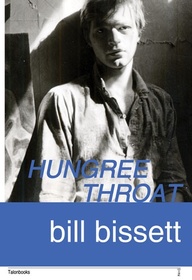 bill bissett's MOST RECENT BOOK hungree throat by bill bissett, Talonbooks, 2013 Description from the Publisher: Written in his non-hierarchic, phonetic orthography, bill bissett’s second novel-poem, hungree throat, recounts the relationship of two men – one bold and unafraid, the other burdened by terrible memories and unable to trust. In this uplifting “novel in meditaysyun” about love, in which we witness ten years of a shared life, we are reminded of the overlapping, sometimes conflicting multitude of “hungers” common to us all: all our throats r hungree 4 breething being sing ing eeting digesting speeking saying food kissing watr love air ficksyun fakt memoree th present what is nu all ovr lapping imbuing change th throat chakra being well is a condishyn 4 life  Nadia Litz Nadia Litz is an award-winning Canadian actress and director. After her debut at Cannes in the award-winning film The Five Senses, Maclean’s magazine voted her “One to Watch” for the new millennium. She played Sam Shepard’s daughter in 2002’s After The Harvest and was nominated for a Gemini Award for Best Actress for that role. In 2007 she won the Vancouver’s Critics Award for her role in Reg Harkema’s Monkey Warfare. Her 2010 short film, How To Rid Your Lover Of A Negative Emotion Caused By You!, produced by the Canadian Film Centre where she was a director-in- residence, premiered at the Toronto International Film Festival in 2010, has played over a dozen film festivals throughout the US, Canadian and internationally, including out-of-competition at the Cannes Court Metrage, winning best short at Austin’s Fantastic Fest 2011. In 2012 Litz was featured on the prestigious Wholphin anthology, alongside Jay Duplass (Jeff Who Lives At Home) and Sean Durkin (Martha Marcy May Marlene). Recently Litz completed an experimental short doc on Canada’s revered and controversial Right Honorable Adrienne Clarkson, which makes its world premiere at VIFF in September 2012. Her first feature Hotel Congress, a comedy-of manners that takes place in a Tucson hotel is in post-production. While her second feature, a love story that takes place in a suicide forest in Japan, goes to camera in 2013. You can follow her on Twitter. RUSTY TALK WITH NADIA LITZ Kathryn Mockler: What is your first memory of writing creatively? Nadia Litz: In grade school we had to choose a story of a historical figure, do research on the figure, and then make a book on that figure. We had to write it, illustrate it, and even bind the book ourselves. My dad had taken me to go and see Milos Forman's Amadeus and I became obsessed with it and subsequently Mozart, so I chose to write my "book" on him. I called it "Wolfie". KM: When did you first start directing and writing for film? NL: I tend to do a lot of "research" before I try something. I read screenwriting books and had taken classes, and I had been aimlessly writing pretend scripts and treatments for a while—maybe 10 years. But, it wasn't until my last year of university studying Cinema Studies that I directed. It was a 3-minute experimental short that was an assignment in a directing for non-majors class. It landed me a spot as a director-in-residence at the Canadian Film Center months later. That was in 2009. Which proves I'm a noobie and you should probably stop reading this. KM: How do you think your acting background influences or affects your directing and writing? NL: I think it does but it is hard to articulate how. I suppose I trust what good actors can bring to a moment, so when I was first writing, I tended to underwrite (according to producers and story editors). I continue to learn the balance of what should be on the page and what shouldn't be. I was just re-reading Allan Ball's American Beauty, and in the script he writes a stage direction for the character Carolyn: "Even when she slept she had a look of determination on her face." That kind of writing is gold for an actor. As an actor if I read that one line, I would understand the character, so I try to be mindful of things like that when I write and when I direct. The script for Butch Cassidy and the Sundance Kid is also full of stage direction like that. Simple editorial clues that will be an anchor for an actor, without force feeding it. I don't mind breaking what might be considered screenwriting convention in order to make a script come alive for an actor; however, I do believe in a firm structure as a base. KM: What inspires the stories you tell? NL: I have noticed that locations seem to inspire the first grain of an idea for me. However, I hope that whatever inspires me at a given time will evolve as I do as a writer. I think the first few stories we tell tend to have a personal element. Filmmakers can seem like we want our trajectory to be the indie personal story root because when we are first starting out, we have budgetary constraints that lend themselves to personal stories. I love including personal elements in my stories, little nods to my life, but I have yet to ever want to tell the truth about my life on film. My preference is to look around me. I also like emotionalizing things that are "concepts". Also, I get a bunch of ideas via the Sunday Times. Too many, really, it's shameful. KM: Was there a writer or filmmaker that had a big impact on you? NL: Kurt Vonnegut was the first great literary writer I read as a teenager. He had those naive drawings in a few of his novels, which always seemed subversive to high art literature and cinematic to me for some reason. His voice resonates with me still. He is wry and detached but wholly emotional to me. His satire is never mean. He points out the meanness of the world because his heart is broken that it is like that. That's how I see him. I relate to that way of thinking. His voice/tone is highly original. The list is too long for filmmakers. However most of the films I love tend to be some form of comedy-of-manners in a broad stroke way. I think a lot of Kubrick's films, for example, are comedy-of-manners so I have a broad idea about that genre. Bunuel, Oshima, Ozu, Rhomer, Kubrick, Cohen Brothers, Whit Stillman, Coppola (Sofia)—usual suspects. KM: When you are directing films that you didn't write—what is the process like? Do you have any advice about what screenwriters can expect when working with a director? NL: I love the process of directing others' work. It's a whole other ballgame then directing your own work, and both are equally satisfying for different reasons. In directing another screenwriter's script you have to find clever ways of making it meaningful to you. It's a challenge to have one more person you need to satisfy. It can be exciting that your only way to tell the story is visually/emotionally. With the short “How To Rid Your Lover of a Negative Emotion Caused By You!” it was a case of having two very strong voices in the mix—the writer Ryan Cavan and mine as a director. It's successful because both visions were honored. KM: When writing your own scripts what is the writing process like for you? How do you approach revision? NL: I love to write. It is a joy. I don't feel bogged down by it. If I hit a block, it's a challenge and I like challenge. The thing that gets me down is when I lose interest in something that I have been working on for some time. Do you try to revive the interest or do you let it go? That's an obstacle for sure. For revisions I like to have a plan. I'll start with strengthening the peripheral characters and work my way towards the protagonist. I just read these great tips from James Schamus, who had some harebrained ideas for revisions I think I might try. Revisions are a drag, but he had these thoughts about standing a draft on its head that seemed very smart. KM: When getting notes from producers—what do you do when you get a note that you don't like or agree with on your script? NL: Only take good ideas and only from people you respect. You know your script and characters better than anyone. People will try to convince to take their note by saying things like "you're too close to the script". I say, "yes!" It is a good thing to be very close to your script. Also, when you are starting out people will tell you are suppose to consider all producer notes, because you are new. Like it is a manners thing. This is what I think: your script is the thing you are the expert on. Have the conversation, if only as a way to articulate why you don't agree with their note, but ultimately you make the choice. You are the CEO of your script and a CEO needs to believe in the company and lead it. No one calls a CEO 'precious' when they believe in their company, so don't let words like that deter you...Now, if you're a bad CEO, your company will fail and the public will let you know quite quickly and you won't be allowed to be CEO anymore! So, you have to be a good CEO! But, ultimately I'm all for screenwriters, respectfully, standing up for a choice. Most producers in the real world respect people who can articulate and communicate a vision. It is your responsibility to instill trust in your producers and funders about that choice, however. Also, that was a really long CEO metaphor. I hope it was clear...Also, if you are a gun-for-hire, it's a totally different thing. Then you apply the note and you find your way into the note. Case closed. KM: What are you working on now? NL: I just finished shooting my first feature called Hotel Congress. I had been in development on what was suppose to be my first feature The People Garden when this opportunity to make a film for no money presented itself. Hotel Congress is a film full of things I swore I would never do. I wrote it in 12 days. Very little revisions. Very talky. We shot the film in 40 hours. I star in it. I co-produced it. I co-directed it with Michel Kandinsky. Did I mention we shot the entire feature in 40 hours? We shot it on location in Tucson Arizona in a hotel called Hotel Congress. It is a romantic comedy-of-manners that we shot in 40 hours. We're in the edit now. We don't know if we're crazy, but so far we love it and think it's quite charming, actually. It was made with so much drive and love by an insular team of my favorite co-horts. It would be impossible not to love a feature film. That you shot. In forty hours. In the desert. I hope to make my film The People Garden next year. With a smidge more time. HOTEL CONGRESS Feature Film, 2012 Hotel Congress Trailer from Sofia Francis on Vimeo. Nadia Litz and Michel Kandinsky – Directors’ Statement “Instead of bashfully wearing its microscopic budget as a badge of honor, Nadia Litz and Michel Kandinsky’s HOTEL CONGRESS aims for a genuine economy of craft. Ironically, in a project devised and executed in the shadows of the Canadian production stream, it’s a combination of old fashion virtues – a resonant location, clever camera placement, and a worthily wordy screenplay – that elevates Litz and Kandinsky’s first feature debut beyond a novelty item.” –Adam Nayman (Cinema Scope, The Grid) Hotel Congress is a tender comedy-of-manners about two people who meet in a hotel famous for its nefarious associations to Depression era bank robber John Dillinger. Sofia and Francis try not to have an affair, while trying to find true love. The film comically deals with ethics in an unethical situation and could aptly be re-titled “What Happens When Cynics Try To Care.” Or “Why John Dillinger is Not A Bad Guy.” The film was Shot for a $1000, in under 40 hours at the historic Hotel Congress in Tucson Arizona. Litz had been to the hotel 7 years prior to see the post-punk band Interpol play a show in the parking lot. She was struck by the dichotomous feeling of isolation and warmth the hotel had. The way the hotel felt stuck in time. Nadia Litz (writer, co-director, co-producer, actress): This film was under ‘willing duress’ from the start. I say willing because we wanted to prove a point in this very competitive market: you just need some smarts and an air tight work ethic to make an interesting film. Film at its best is about ideas and relatable emotion. Let that be the end of budget and time constraints. When you start to think of what you can do for $1000, you quickly realize the script can save you. In writing this particular project, I focused on films that we all deeply admired the dialogue of (because dialogue doesn’t need lighting!) and why those films work. Obviously we love Mamet and Woody Allen and Hal Hartley and of recent years Lena Dunham comes to mind. We were going through a major Sturges period – hence the 4:3 - his films are simply shot, but beautifully romantic yet not at all ‘twee’….But, Whit Stillman is still the quintessential dialogue screenwriter for me. His characters are satirical, but his films are tender in a way that sneaks up on you. Could the Chris Eigeman character be more of a jerk, that you ultimately feel for, because a) he is truly stuck in his own jerk-ness and b)he’s the least hypocritical character in the Stillman world. I had him in mind for my character Sofia. Stillman’s ideas and his modern philosophy (or philosophy of modernity) are what you care about in his films. Ideas and philosophies don’t inherently cost money so they bode well for indie filmmaking. That seemed like the highest bar to work towards. I’m not into improvisation, shooting everything and finding the film in the edit for indie filmmaking. I think you need to be more meticulous and disciplined in the basics of the craft as an indie filmmaker I wrote the film round the clock in twelve days. We were shooting three weeks later. Every word we said is in the original script. It felt mischievous to do it that way, to not belabor the process with second-guessing and rewrites. Just write it and shoot it. When you don’t try to fit into a preconceived mold, the mode of storytelling becomes more interesting. You feel uncensored. Michel Kandinsky: (co-director, co-producer) For me, the film is about two people trapped by their own erudite, iconoclast self-awareness. They know what to say at the appropriate moment and how to say it in a clever way but this knowledge keeps them from feeling as deeply as they could. I approach film as an intuitive medium, one in which too much thought gets in the way when time on set is spent trusting your intuition. It’s the opposite of what the characters in the film are doing, until they do it…And then once they trust in it they become the kind of love they aspire to, without even realizing it. This was the first time I had co-directed anything. The remarkably short amount of time that we had to shoot this film kept us from too much discussion once we were on set. We simply didn’t have the ability to talk things out once we started shooting. We had to trust the script and our base instincts, keep out the temptation to over-think. I think that comes through in the finished product. There’s an energy there that I find very empowering. We knew we had to just start. Starring Nadia Litz Philip Riccio Director Nadia Litz Michel Kandinsky Writer Nadia Litz Producer Nadia Litz Michel Kandinsky Philip Riccio & Daniel Bekerman Exec Producer Ingrid Veninger Stacey Donen Cinematographer Daniel Grant Editor Jonathan Eagan Sound Editing Gabe Knox Song by Paul Banks HOW TO RID YOUR LOVER OF A NEGATIVE EMOTION CAUSED BY YOU! Short Film, 2010 Produced by the Canadian Film Centre Directed By: Nadia Litz Starring: Sarah Allen & Joe Cobden Screenplay By: Ryan Cavan Produced By: Heather K. Dahlstrom & Daniel Bekerman Edited By: Alexandre-Nicholas Giffard Director of Photography: Daniel Grant Production Design By: Nazgol Goshtasbpour Description Love can make us do weird things. Sadie does a weird thing. She does it to her boyfriend Dennis. Keep in mind she only wants what's best for both of them—a perfect relationship. It could be the perfect relationship, too, as long as nobody bleeds to death. 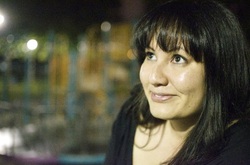 Sachiko Murakami Sachiko Murakami is the author of the poetry collections The Invisibility Exhibit (Talonbooks, 2008), a finalist for the Governor General’s Literary Award and the Gerald Lampert Memorial Award, and Rebuild (Talonbooks, 2011). She has been a literary worker for numerous presses, journals, and organizations, and is Poetry Editor for Insomniac Press. She is the initiator of the online collaborative poetry projects Project Rebuild and PowellStreetHenko.ca. She lives in Toronto. RUSTY TALK WITH SACHIKO MURAKAMI Kathryn Mockler: What is your first memory of writing creatively? Sachiko Murakami: I would write fake diary entries about what me and my friends did after school. I would write these after school alone in my room (often hiding behind a piece of furniture), as I had no friends. KM: Why did you become a poet? SM: Um. See: friendless and hiding behind furniture, above. Clearly I was not going to be a professional soccer player. KM: Could you describe your writing process? (For example, do you write every day? When? Where? How do you approach revision, etc.) SM: Step 1: Find something that hooks a thought into a line. Most often I find this happens while walking in an unfamiliar neighbourhood, reading a poem, waking in the middle of the night, etc. Step 2: Scribble line down (usually on a smudgy receipt, as I am rather bad at keeping notebooks on hand). Step 3: Bring line to page. Step 4: Keep going. Step 5: Revision is an evolutionary process. I wrestle around with the poem for a while, take a break, return, repeat. Then I bring the poem to someone else and watch as they politely break its beautiful legs. Then I begin again. KM: Rejection or criticism can often stop writers before they start. Do you have any advice on how to deal with rejection? SM: Stay open! Prepare yourself for the gifts criticism and rejection are going to give you: resilience, yes, but also a curiosity about your work, and better writing. Invite in editors who will politely break your poem's limbs (the key word being politely). Take a workshop. Start a writing group. Get used to criticism, and use criticism. Listen to the questions that are being asked of your poems. Take the serious questions seriously. Rejection from publishers and literary journals is, for the most part, a numbers game. When I read for literary magazines, there would be a hundred poems submitted for every one page available. If publication is your goal, then try your best to write publishable material. If writing is your goal, then keep writing. KM: You used to co-host the Pivot Readings at The Press Club in Toronto. Do you have any advice or tips for new writers about performing their work in front of audience? SM: Don't: pre-explain your poems, get drunk beforehand, or go over your allotted time. Do: Talk to your audience. Look at them. Invite them in to your poems. Go under time. Then thank your hosts and the bar. KM: From your perspectives as an editor and poet, how would you describe the writer/editor relationship? What should a new writer expect once his or her manuscript is accepted by a publisher? SM: See above re: breaking of limbs, asking serious questions. As an editor, I think I develop a stronger relationship with the manuscript than with the writer. In terms of the publishing process, a first-book author can expect to develop the quality of patience. A manuscript passes through many busy hands before it becomes a book. KM: Can you tell us about your collaborative poetry projects? What got you interested in collaborative poetry? What has the response been? SM: ProjectRebuild.ca began when I invited some poets into a poem about a Vancouver Special (a type of house in Vancouver). I was interested in seeing how they would interpret my invitation to renovate it as they saw fit. I then had a friend, Starkaður Barkarson, create a website in which any of the poems can be "moved into" and "renovated". There has been a tremendous response to this project—over 200 poems on the site from contributors across the world. The source poem, "Vancouver Special", resides in my second collection, Rebuild. PowellStreetHenko.ca is an online renga commissioned by the 2012 Powell Street Festival. A renga is a collaborative Japanese form in which each stanza is written by a new person. This renga expands outwards, as you can respond to every stanza in the poem (not just the last one written, as in a traditional renga). Powell Street Festival is a Japanese-Canadian festival held in Vancouver. They asked me to create something like Project Rebuild for them, and this is what I came up with (along with Starkaður). I travelled to Vancouver this summer to launch the project at the festival, and since then the poem has slowly grown as people reflect on change ("henko"), the theme of the poem. Why do this? I like the idea of putting writing out there that can be taken and messed around with and misinterpreted and reused and repurposed. I like the discomfort it brings. I like prying my writing from my ego's fist. I like conversations. KM: What is your funniest or favourite literary moment that you've experienced. SM: Jacob McArthur Mooney leaving the stage during his reading at Pivot to buy the audience cotton candy from the street vendor passing by on Dundas. No wonder he's the new host. KM: What are you working on now? SM: Poems about airports/the struggle to stay present. A novel about fake orphans. SACHIKO MURAKAMI'S RECENT WORKS  Rebuild, Talonbooks, 2011 Description from the publisher: In a city ironically famous for its natural setting, the roving subject’s gaze naturally turns upward, past the condo towers which frame the protected “view corridors” at the heart of Vancouver’s municipally- guaranteed development plan. But look for the city, and one encounters “a kind of standing wave of historical vertigo, where nothing ever stops or grounds one’s feet in free-fall.” Murakami approaches the urban centre through its inhabitants’ greatest passion: real estate, where the drive to own is coupled with the practice of tearing down and rebuilding. Like Dubai, where the marina looks remarkably like False Creek, Vancouver has become as much a city of cranes and excavation sites as it is of ocean and landscape. Rebuild engraves itself on the absence at the city’s centre, with its vacant civic square and its bulldozed public spaces. The poems crumble in the time it takes to turn the page, words flaking from the line like the rain-damaged stucco of a leaky condominium. The city’s “native” residential housing style now troubles the eye with its plainness, its flaunting of restraint, its ubiquity. What does it mean to inhabit and yet despise the “Vancouver Special”; to attempt to build poems in its style, when a lyric is supposed to be preciously unique, but similar, in its stanzas or “rooms,” to other lyric poems? What does it mean to wake from a dream in which one buys a presale in a condo development—and is disappointed to have awoken? In the book’s final section, the poems turn inward, to the legacy left by Murakami’s father, who carried to his death the burden of the displaced and disinherited: the house seized by the government during WWII, having previously seized the land from its native inhabitants—a “mortgage” from which his family has never truly recovered. 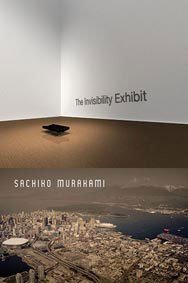 The Invisibility Exhibit, Talonbooks, 2008 Description from the publisher: These poems were written in the political and emotional wake of the “Missing Women” of Vancouver’s Downtown Eastside. Although women had been going missing from the neighbourhood since the late 1970s, police efforts were not coordinated into a full-scale investigation until the issue was given widespread public visibility by Lori Culbert, Lindsay Kines and Kim Bolan’s 2001 “Missing Women” series in the Vancouver Sun. This media coverage, combined with the efforts of activists in political and cultural sectors, finally resulted in increased official investigative efforts, which have so far led to the arrest of Robert Pickton, on whose property the remains of twenty-seven of the sixty-eight listed women were found. In December 2007, Pickton was convicted of six counts of second-degree murder in what had become one the highest-profile criminal cases to take place in B.C.’s history; yet this is not the focus of this book. As the title suggests, the concern of this project is an investigation of the troubled relationship between this specific marginalized neighbourhood, its “invisible” populations both past and present, and the wealthy, healthy city that surrounds it. These poems interrogate the comfortable distance from which the public consumes the sensationalist news story by turning their focus toward the normative audience, the equally invisible public. In the speaker’s examination of this subject, assumptions and delineations of community, identity and ultimately citizenship are called into question. Projects such as Lincoln Clarkes’ controversial Heroines photographic series and subsequent book (Vancouver: Anvil Press, 2002), news stories, and even the 2010 Vancouver Olympic Winter Games circulate intertextually in this manuscript, while Pickton’s trial is intentionally absent. Irritated by complacency, troubled by determinate narrative and the relationship between struggle and the artistic representation of struggle, Murakami is a poet bewildered by her city’s indifference to the neglect of its inhabitants. RUSTY TALK WITH EMILY SCHULTZ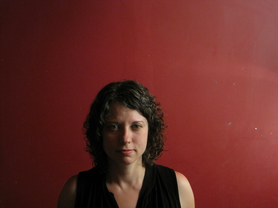 Emily Schultz Emily SchultzPhoto by Brian Joseph Davis Emily Schultz's first book, Black Coffee Night, was a finalist for the Danuta Gleed Award, while her second, Joyland, received rave reviews. Her most recent novel, Heaven is Small, was a finalist for the 2010 Trillium Award alongside Margaret Atwood, Alice Munro, Ian Brown, and Anne Michaels. Her writing has appeared in The Globe and Mail, Eye Weekly, The Walrus Magazine, and several anthologies. Schultz also edits an influential website called "Joyland," which publishes short fiction and commentary from across North America. For this work, she was named one of Canada's digital innovators by Quill & Quire magazine. Schultz lives in Toronto and New York. Kathryn Mockler: What is your first memory of writing creatively? Emily Schultz: When I was in second grade I penned two “books” with hand-drawn covers. I took them in to my schoolteacher and demanded that she read them aloud to the class. One was called The Adventures of Molly Mouse, the other Hemp the Horse. I’m not sure where I’d heard that word, but I thought it made a good name. I guess you could say I started off as a DIY author. KM: Why did you become a writer? ES: I really didn’t feel I had a choice. For example, see above. KM: What influences your writing the most? ES: It varies from book to book. With The Blondes, I guess the contemporary media-scape: the noise of news, disaster, and TV shows like She Survived That … Pregnant?! KM: Could you describe your writing process? (Do you write every day? When? Where? How do you approach revision.) ES: With this book, I wrote the first draft fast, consciously changing my process, which is normally slow and meticulous, weighing every line. My husband and I holed up in a desert cabin for several weeks without internet and that is where I did the bulk of the first draft, writing every day from 9 ‘til 4 while staring out the window at the mountains and desert scrub bush. Strangely, writing quickly I had less structural questions to attack in later drafts, and the characters—although they still needed work—were more consistent. There wasn’t time for self-doubt. KM: Rejection or criticism can often stop new writers before they start. Do you have any advice on how to deal with rejection? ES: Everyone gets rejected. As you become more successful you’re only going to face more or bigger rejections, so you have to get used to it and learn not to obsess. Have a cry, have a drink, watch something stupid on YouTube, and then fuhgeddaboudit. KM: What writers would you recommended to an aspiring writer? Or what writers were influential to you when you first started out? ES: I think you have to find your own writers. I remember when I was young people would tell me, “Oh you simply must read … It will change your life!” and I never seemed to relate to any of those books. I wondered what was wrong with me. And so, although I found writers I related to later, when I was first starting out I tended to write in reaction to work I didn’t care for. I knew more what I didn’t want to be than what I did—but knowing that part actually helped me immensely. KM: What is the best literary advice you've been given that you actually use? ES: Every story must have a beginning, middle, and end—from Aristotle, and my sixth grade teacher. KM: Your funniest or favourite moment that you've experienced as a writer or in the literary world. ES: It doesn’t get any more Canadian than this story. I was in Halifax at a Broken Social Scene concert when a young woman approached me in the crowd. She asked if I was Emily Schultz. She’d read my book and recognized me from a newspaper photo. This was about ten years ago, and it was the one and only time anyone ever recognized me at a non-literary event. I felt like a star. KM: Can you tell us about your new book The Blondes? ES: If this were a Hollywood pitch meeting, my one line would be: Blondes, with rabies. But this isn’t a Hollywood pitch meeting, so I’ll see if I can give a bit more of an impression. Plot-wise, it’s about a grad student who finds out she is pregnant from an on-and-off-again relationship with her married thesis advisor. She’s exploring all these feelings of being bewilderment, not knowing how she feels about him, about her own actions, or if she should keep or terminate the pregnancy, when an epidemic (a virus affecting only blonde women) forces her actions and her fate. I wanted to explore how women both threaten and relate to one another, and at the same time work again in the satirical form. I also wanted the book to be an action-adventure novel for women. KM: What are you working on now? ES: My next novel is still too early to talk about. But I’m doing some screenwriting with my husband Brian Joseph Davis. It’s a TV show about life at an alternative weekly. 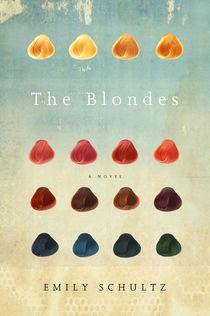 EMILY SCHULTZ'S MOST RECENT NOVEL The Blondes, Random House, 2012 Description from the publisher A breakout novel for a young writer whose last book was shortlisted for the Trillium Prize alongside Anne Michaels and Margaret Atwood, and whom the Toronto Star called a "force of nature." Hazel Hayes is a grad student living in New York City. As the novel opens, she learns she is pregnant (from an affair with her married professor) at an apocalyptically bad time: random but deadly attacks on passers-by, all by blonde women, are terrorizing New Yorkers. Soon it becomes clear that the attacks are symptoms of a strange illness that is transforming blondes--whether CEOs, flight attendants, skateboarders or accountants--into rabid killers. Hazel, vulnerable because of her pregnancy, decides to flee the city--but finds that the epidemic has spread and that the world outside New York is even stranger than she imagined. She sets out on a trip across a paralyzed America to find the one woman--perhaps blonde, perhaps not--who might be able to help her. Emily Schultz's beautifully realized novel is a mix of satire, thriller, and serious literary work. With echoes of Blindness and The Handmaid's Tale amplified by a biting satiric wit, The Blondes is at once an examination of the complex relationships between women, and a merciless but giddily enjoyable portrait of what happens in a world where beauty is--literally--deadly. Kathryn Mockler is the publisher of The Rusty Toque.
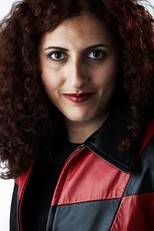 Priscila Uppal Photo by Daniel Ehrenworth Priscila Uppal is a Toronto poet, fiction writer, and York University professor. Among her publications are seven collections of poetry, most recently Ontological Necessities (2006; shortlisted for the $50,000 Griffin Poetry Prize), Traumatology (2010), and Successful Tragedies: Poems 1998-2010 (Bloodaxe Books, U.K.); and the critically acclaimed novels The Divine Economy of Salvation (2002) and To Whom It May Concern (2009). Her work has been published inter-nationally and translated into numerous languages. RUSTY TALK WITH PRISCILA UPPAL Kathryn Mockler: What is your first memory of writing creatively? Priscila Uppal: I remember writing stories about my neighbours. My goal every day was to get myself invited to other people's houses for dinner. I loved watching other people eat and interact with each other. I loved looking through playbins, drawers, medicine cabinets. I was fascinated by people's parents, what they deemed acceptable behaviour or not, what they made for dinner, what gods they worshipped. I honestly think I became a writer because I was pretty nosy about my neighbours. KM: Why did you become a poet? PU: Because I didn't know it was something I could be. I read lots of poems and felt at home inside the language of poetry—metaphor, ambiguity, utterance. Then I started writing them. I wrote poems as a teenager almost every single day, and I haven't really stopped. I went to university because I soon learned that I could actually get scholarship money to read and write poetry and other books all day. That seemed too good to be true—criminal even. So, I took advantage of it. And I suppose I still am. KM: Could you describe your writing process? (Do you write every day? When? Where? How do you approach revision, etc.) PU: I probably do engage in writing every day but the type varies. I write poetry, fiction, creative non-fiction, plays, essays, articles, lectures, even interviews. I tend to write in one form while I am editing another. This kind of cross-pollination, I think, keeps my brain firing in interesting ways. I always work on more than one project at once. That way if I'm stuck or bored, I will switch to another project until I figure a few things out and can return with renewed energy. KM: Rejection or criticism can often stop poets before they start. Do you have any advice on how to deal with rejection? PU: I listen to criticism if it comes from a trusted or intelligent source. I then try to figure out if I think it's fair or valid or something to ponder while I write other work. But I don't listen to rejection. If a magazine or publisher doesn't want my work, that's fine, then it's not the right place for the work. Sometimes the hardest part of publishing is figuring out where a piece will find a home. If you consider that phrase "finding a home," it's apt because if you're someone who knows what it's like to be on your own (I left home at 15, and so know this quite well), then it doesn't seem strange that you might not find the perfect place right away. KM: What poets or writers would you recommended to an aspiring poets? Or what writers were influential to you when you first started out? PU: I think it's hard to sort through all the stuff out there. Every aspiring poet probably already has some favourite poets, so I might suggest finding out who those poets read and liked and who they were reacting against to get a sense of how a poet works within the world of poetry. I think it's important to read widely and internationally and that if you don't have people in your circle who can recommend writers that might be of particular interest to you in terms of what you might already be writing and reading, then taking a class can help draft a new reading list and bibliography. I discovered lots of writers through taking courses and those teachers recommending more writers to me. KM: What is the best thing about being a writer and what is the worst thing? PU: The best thing about being a writer is that I can work almost anywhere. My favourite place to work is beachside in Barbados. I write for hours in the morning, then run on the beach, then make notes and read all afternoon and swim. I can't think of a better life than that. The worst thing about being a writer is that everyone asks you what you really do for a living. I was hired by the university as a poet. I teach poetry and other arts. I tell people that I might not make all my money through book royalties, but I do indeed make my living as a writer KM: Your funniest literary moment, if you have one. PU: One of the funniest was in Sri Lanka at the Galle Literary Festival (a wonderful and warm festival by the way, in a beautiful old Dutch fort town). The opening reception was on this glorious property on a hill and sponsored, in part, by the government of Sri Lanka. As we walked in, young Sri Lankan boys played bagpipes, dressed in Scottish outfits. An orchestra of other young people in elaborate school uniforms played on the grass. Champagne flutes of lime juice were passed around and plates of warm nibbles. At the end of the reception, as we were to talk to the next venue for the evening, further down the hill, a flurry of fireworks exploded. They were so unexpected and near to us that many of us screamed, held our hearts, and tried to steady ourselves as we laughed in both amusement and fear. The fireworks kept coming. Louder. Closer. Bits of fire fell directly in front and behind us the entire time. In order to contain our fear, many of us laughed, and kept laughing. When it was finally over, we writers all looked at each other in relief, trying to figure out if this was the usual welcome for writers for the festival. KM: What are you working on now? PU: I'm just about to leave for London to resume my position as Canadian Athletes Now Poet-in-Residence during the 2012 Olympics and Paralmpics. I'll be writing and publishing two poems per day, one on the Canadian Athletes Now website and one on the Literary Review of Canada website (under Poet's Corner). I will also be posting an article every two days on the LRC website about sports art. This is a project I am very passionate about—encouraging sport and artistic practice, breaking down stereotypes between the sports and arts worlds, and bringing poetry to new audiences in a fun and exciting way. I will be working on the companion to Winter Sport: Poems, called fittingly Summer Sport: Poems, to be published in early 2013. Follow Priscila Uppal |
Rusty Talk
Rusty Talk Editor: Archives
November 2017
Categories
All
|

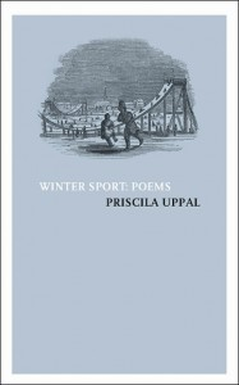

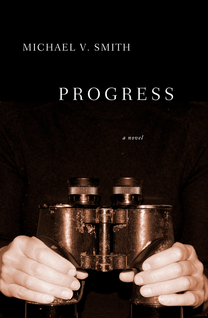
 RSS Feed
RSS Feed
